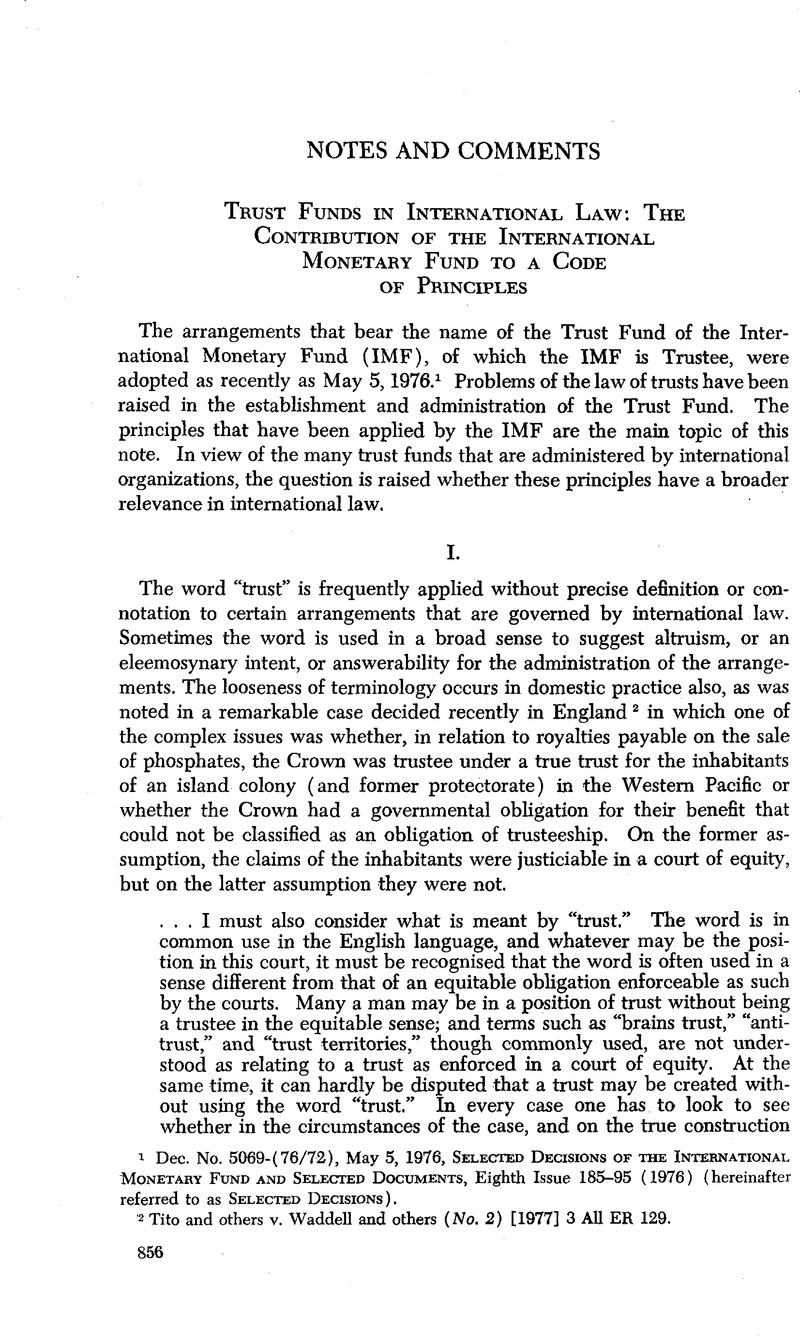Published online by Cambridge University Press: 27 February 2017

1 Dec. No. 5069-(76/72), May 5, 1976, Selected Decisions of the International Monetary Fund and Selected Documents, Eighth Issue 185–95 (1976) (hereinafter referred to as Selected Decisions).
2 Tito and others v. Waddell and others (No. 2) [1977] 3 All ER 129.
3 Id., at 216, per Megarry V-C.
4 Dec. No. 4773-(75/136), Aug. 1, 1975, Selected Decisions 81–83. Contributions to the Subsidy Account were invited from members of the IMF in a sufficiently strong position to make them. The objective is to assist the 39 members that have been most seriously affected by the increase in the cost of importing petroleum and petroleum products to pay charges for the use of the IMF's resources under its policy called the “oil facility” for 1975. The charges levied by the IMF for the use of its resources under a policy must be uniform for all members (Art. V, (8)(d)).
5 See Tito v. Waddell (No. 2) [1977] 3 All ER 129, at 220.
6 See note 1 supra7.
7 6 International Encyclopedia of Comparative Law (Property and Trust), Ch. 11 (Trust, ed. William F. Fratcher 1972) §§ 101–141.
8 Art. I (i).
9 2 Henry G. Schermers, International Institutional Law 419–20 (1972).
10 Elting Arnold in The Effectiveness of International Decisions 384 Stephen M. Schwebeled. (1971).
11 444 UNTS 259; 503 UNTS 388.
12 419 UNTS 125.
13 Art. V (2)(b).
14 Art. VII (2) (ii) (before the Second Amendment).
15 Schedule B para. 7.
16 Gold, Joseph, Uniformity as a Legal Principle of the International Monetary Fund, 7 Law And Policy in International Business, 765–811 (1975)Google Scholar.
17 Wilfred Jenks, The Proper Law of International Organisations 187(1962).
18 The Commentary in the Report by the Executive Directors to the Board of Governors on the Proposed Second Amendment contains the following passage in explanation of Art. V (2)(b):
Operations and transactions involved in the performance of these financial services would not be on the account of the Fund. That is to say, the assets in the Accounts of the General Department or any assets in the Special Drawing Rights Department would not be available to meet obligations or liabilities incurred in the course of these services. The assets administered by the Fund under this provision might be owned by the Fund if certain legal techniques, such as a trust, were employed, and, therefore, to take one example, the assets would be assets of the Fund for the purposes of the immunities and privileges of Article IX even though they would not be held within the General Department (Article XVI, Section 2). Services rendered by the Fund under Article V, 19
Section 2(b) cannot impose obligations on a member unless it agrees to assume them. As in the past, the Fund would be able to absorb the administrative costs of the services or agree with members on some other arrangement.
19 Art. IX.
20 Art. V (11).
21 Dec. No. 4242-(76/67), June 13, 1974, Selected Decisions 122–28.
22 Tito v. Waddell (No. 2) [1977] 3 All ER 129, at 241.